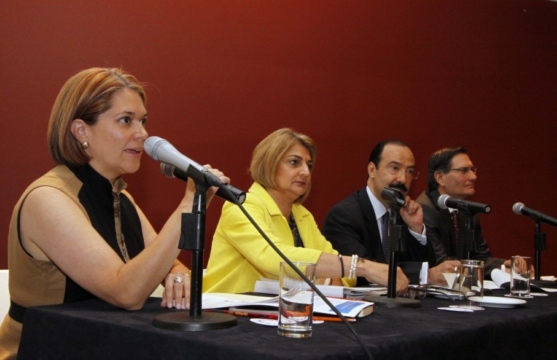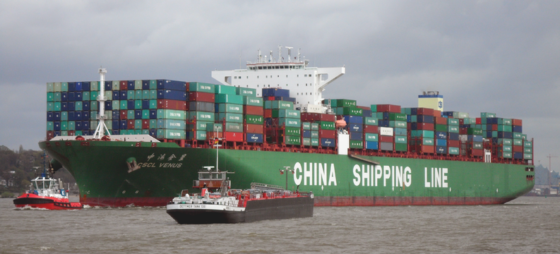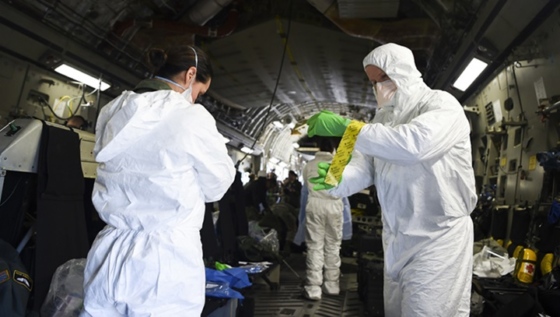
Mexico’s Energy Reform & the Skills Gap
Mexico has no shortage of skilled workers but needs to better align the qualifications of its graduates with the needs of the energy sector.
On July 30, 2020, the Inter-American Dialogue's Corporate Program hosted “Economic Recovery and the Potential for Expanding Production in the Americas,” a webinar featuring Martha Bárcena, Mexico's ambassador to the United States, Michelle DiGruttolo, senior managing director at Ankura, Gabrielle Trebat, managing director at McLarty Associates, and Edgar Villanueva, co-executive director of the US-Guatemala Business Council. Margaret Myers, director of the Asia & Latin America program, moderated the event.
The discussion focused on the ways in which Covid-19 has disrupted regional supply chains, the prospects for Latin America and the Caribbean to attract more investment in manufacturing and production away from Asia, and the need for regional economic integration in the post-pandemic recovery.
Martha Bárcena focused her remarks on the lessons that the North American subregion offers for the rest of Latin America and the Caribbean. She encouraged countries across the region to focus on addressing the disparities among populations that the pandemic has exacerbated, declaring that “we are not the poorest region in the world, but we are the most unequal one.” Bárcena also focused on the recent USMCA negotiations as a successful case study of economic integration, encouraging a shift from an “East-West” supply chain that is overly reliant on China to a “North-South” supply chain that links the countries and subregions of the hemisphere. The recent rebound of Mexico’s trade balance in June illustrates the resilience of regional value chains, and free trade will need to adapt to contemporary concerns and circumstances by including provisions for climate, labor rights, and emerging technology, she noted. Bárcena also implored US leadership to acknowledge the contributions of essential workers, many of whom are Latinx and/or undocumented, and fight for distributive justice.
"Should countries seek to attract investment away from Asia? Yes, yes and of course."
“Should countries seek to attract investment away from Asia? Yes, yes and of course,” Edgar Villanueva said. The most logical place to start is with the “low-hanging fruit” in today's investment climate resulting from the pandemic, in which some industries considered to be critical have decided to diversify production to places other than China. He also described an example from his home country of Guatemala, where a shoe company, despite being outproduced and outpriced by competitors in China, was nonetheless able to take advantage of lower sourcing and transport costs to export profitably with the United States. In order to foster this type of trade and investment, the region needs more flexible financing, less bureaucracy and better infrastructure, which can be achieved through collaboration between the public and private sectors. In addition, national governments must commit to improving legal frameworks and the rule of law to fight corruption and reform perverse incentive structures, which would in turn attract investment. Villanueva cautioned against the tendency to declare national "self-sufficiency" as a goal in post-pandemic recovery, which he called dangerous rhetoric that masks the potential for healthy interdependence and resilient supply chains that can link and mutually benefit the countries of the region.
According to Gabrielle Trebat, businesses have been rethinking their global supply chains for years, but Covid-19 has been the final push to address their dependence on single-country suppliers. In order to capitalize on these opportunities, however, the region needs a cohesive regional integration strategy that can attract production and also kickstart the post-pandemic recovery. The automotive industry serves as an example of how regional leverage can boost overall competitiveness and frame the region as an alternative to southeast Asia. Latin America and the Caribbean has many strengths that it can harness, such as young labor force, low wages, existing free trade agreements and proximity to US markets. Even so, recent discussions surrounding OECD membership have involved some structural concerns endemic to the region, such as a low proportion of skilled laborers, an inefficient taxation system, poor rule of law and subpar infrastructure. Targeted, collaborative reforms such as digitizing and standardizing permitting and licensing across the region would go a long way to improving social inclusion and job creation. Existing institutions such as the Pacific Alliance can facilitate this process if countries possess the political will to cooperate.
Finally, Michelle DiGruttolo approached the conversation from the wider lens of geopolitics. Given the projections showing that Latin America will not make a full economic recovery for several years, globalization as it currently functions will be replaced by a “globalization 2.0” that is largely driven by the politics of technology, exemplified by the 5G debate. The decision of whether or not China-based telecommunications equipment maker Huawei will supply the region’s 5G networks is essential for understanding the region’s potential for economic integration, because efficient supply chain integration would ideally utilize a common digital infrastructure. DiGruttolo also discussed the social factors, such as inequality and violence, that have been exacerbated by the economic crisis. To address these issues, governments must prioritize pro-investment policies that encourage public-private relationships that bring benefits to the entire country beyond profits for a given sector. This “globalization 2.0” will also entail different priorities than profit alone, including climate concessions and inclusive growth, driven by the new generation of leaders and consumers.
During the Q&A section, Trebat emphasized the role of the private sector in fighting corruption by coordinating with multilateral organizations, while Bárcena gave the example of Georgia as a country in which the citizens stopped viewing corrupt politicians as successful individuals, and instead as an embarrassing stain on society, in order to encourage transparency and accountability. Panelists also discussed the América Crece initiative spearheaded by Mauricio Claver-Carone, the Trump Administration's nominee to run the Inter-American Development Bank, who, along with outgoing IDB President Luis Alberto Moreno, has called for an economic recovery that is "Made in the Americas."
Can Central America attract a slice of the Chinese pie? (August 5, 2020 – BNAmericas)
Mexico has no shortage of skilled workers but needs to better align the qualifications of its graduates with the needs of the energy sector.
How are escalating U.S.-China trade tensions affecting global supply chains and the role of Latin American and Caribbean nations in them?
What will be the coronavirus outbreak’s global economic fallout, and how will such trends affect Latin American and Caribbean economies?
 Main Photo: Government of Mexico
Main Photo: Government of Mexico

